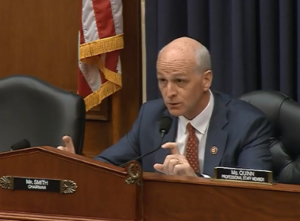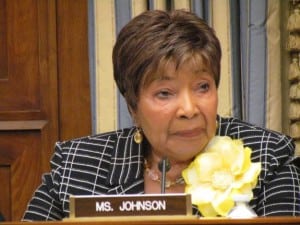The House Armed Services and Science Committee chairs are looking to work with the Biden administration on U.S. academic research security amid worries about China, according to a recent letter.
“As you develop the specific policies to support your approach on China, we write to express our keen interest in collaborating with you to address the risks to the country’s research enterprise posed by undue foreign influence,” House Science, Space and Technology Chairwoman Eddie Bernice Johnson (D-Texas), House Armed Services Chairman Adam Smith (D-Wash), House Science Subcommittee on Research and Technology Subcommittee Chairwoman Haley Stevens (D-Mich.), and House Armed Services Subcommittee on Cyber, Innovative Technologies, and Information Systems Subcommittee Chairman Jim Langevin (D-R.I.) wrote in an April 9 letter to the White House.

The letter argued the administration can build on and learn from previous administrations “to address legitimate security concerns while fostering an open and collaborative research environment.”
The chairs are concerned by the decline in international student enrollment in recent years and urged the Biden administration to “refine and update” policies to recruit people from around the world while still addressing any security risks.
According to the committee chairs, the main components of a “measured and balanced approach” to increasing security for the U.S. academic research enterprise should include transparency about the nature and scale of the risks, coordination and clarity regarding research security and integrity requirements, a commitment to openness and collaboration, strong investment in American research and development (R&D), and a trusting partnership between the federal government and academic community.
In arguing for transparency, the members underscored that so far the academic community has not had a clear explanation of the risks to research integrity and security posed by undue foreign influence.
“Instead, there has been an overreliance on anecdotes. This lack of transparency has, understandably, led well-meaning individuals to question the intent behind an increased emphasis on security, which in turn impedes efforts to foster a sense of shared responsibility. To the extent possible, we encourage you to provide information and data to clarify the nature, scale, and scope of the threats.”
The letter also applauded the “important steps” taken by federal science agencies like the National Science Foundation (NSF), National Institutes of Health and Department of Energy (DoE) have taken to mitigate risks to federally funded research, but said the lack of coordination has increased confusions and administrative burdens on institutions and researchers trying to comply with changing funding requirements.
“We encourage a harmonization of research integrity and security policies across the federal government. We also strongly support improved communication of agency funding requirements to ensure university administrators and individual researchers and students understand what is expected of them and have the support they need,” the letter said.

The letter urged President Biden to reaffirm President Ronald Reagan’s 1985 National Security Directive 189 to reiterate the importance of openness and an open exchange of ideas in advancing basic research. The directive established a national policy that “to the maximum extent possible, the products of fundamental research remain unrestricted.”
In discussing U.S.-based R&D, the letter focused on China’s rising global research prominence in relation to lagging U.S. investment amounts.
It said that in 2004, China surpassed the U.S. in the number of bachelor’s degrees awarded in science and engineering, surpassed the U.S. in publications of science and engineering research papers in 2016, and as of November 2017 China claimed to have 202 of the fastest 500 supercomputers in the world versus 143 in the U.S.
“Our standing as the global leader in science and innovation is waning, but this trend is not attributable to foreign influence or espionage. It is a result of stagnant investment in U.S. R&D in recent years. While it is important to counter undue foreign influence in U.S. research, the best response to China’s rise as a leader in science and innovation is a significant increase in funding for U.S. R&D,” the letter said.
The letter concluded by noting while mitigating risks to federally funded research requires trust, the differing cultures between law enforcement and the academic community “have made productive collaboration, at times, difficult.”
They recommend research agencies work with the Department of Justice to develop guidance and resources for researchers to understand potential security risks while encouraging the department to raise awareness among its prosecutors and investigators to understand the norms and practices of the research community with its values of openness and international collaboration.
The members also said they are encouraged by the Justice Department discussions to start an amnesty program for researchers coming into compliance without reprisal and urge government research agencies collaborate similarly on full reviews of the research security approaches by the Departments of Education, State and Homeland Security.
Previously, members from both committees introduced the Securing American Science and Technology Act of 2019, which became the basis of Section 1746 of the FY 2020 defense authorization bill.
The letter said the bill directed the Director of the Office of Science and Technology Policy to “establish an interagency working group to protect federally funded research and development from foreign interference, cyberattacks, theft, or espionage and develop common definitions and best practices for Federal science agencies and grantees.”
It also directed the NSF, DoE and the Defense Department to enter into a joint agreement with the National Academies of Sciences, Engineering and Medicine to create a ‘National Science, Technology, and Security Roundtable.’ The letter was released by the Science Committee on Monday.